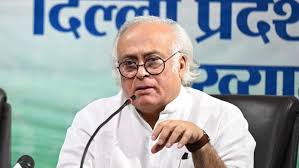‘Undeclared Emergency@11’: Congress hits back with ‘five-fold assault’ charge against BJP

New Delhi, June 25 – On the 49th anniversary of the 1975 Emergency, the Indian National Congress launched a sharp political offensive titled ‘Undeclared Emergency@11’. The party accused the BJP-led government of a five-fold assault on India’s democratic foundations, drawing comparisons with the dark days of the Emergency imposed by Indira Gandhi.
This move followed Prime Minister Narendra Modi’s post condemning the 1975 Emergency. However, the Congress argued that today’s crisis is more subtle, sustained, and dangerous—a new form of undeclared emergency.
🔴 Congress Outlines a Five-Fold Assault
Speaking at the AICC headquarters, senior Congress leaders accused the BJP of attacking democracy on five key fronts:
1. Federalism Under Threat
Congress alleged that the BJP is undermining India’s federal structure by misusing central agencies like the CBI and ED against opposition-ruled states. They pointed to incidents in West Bengal, Tamil Nadu, and Delhi where central interference disrupted governance.
“This isn’t cooperative federalism; it’s coercive control,” said Congress leader Jairam Ramesh.
2. Judiciary Losing Independence
The Congress claimed the central government delays judicial appointments and pressures courts. By doing so, it influences judicial outcomes and undermines constitutional checks and balances.
3. Media Freedom Suppressed
The third charge involved growing censorship and pressure on media. The Congress cited declining rankings in global press freedom indices and alleged that journalists critical of the regime face harassment.
4. Civil Liberties Curtailed
Congress pointed to the targeting of NGOs, activists, and student leaders. It cited the cancellation of FCRA licenses and the use of anti-terror laws like UAPA to arrest dissenters.
5. Parliamentary Democracy Eroded
The final accusation was that Parliament has become a “rubber stamp.” Congress highlighted repeated MP suspensions and the hurried passing of bills without discussion or debate.
⚠️ “Emergency Without a Name”
Congress leaders claimed the situation is worse than in 1975. They argued that while the Emergency then was declared, today’s emergency is invisible and long-lasting.
“Today, there is no formal announcement. Yet, freedoms are fading. That’s more dangerous,” said Supriya Shrinate.
They launched a digital campaign using the hashtag #UndeclaredEmergency to spread awareness. Through videos, infographics, and social media posts, the party explained how democratic spaces are shrinking under the Modi government.
🔵 BJP’s Response
BJP leaders dismissed Congress’ charges as hypocritical. Union Minister Smriti Irani said the Congress has no moral authority to speak on democracy, given its own role in jailing opposition leaders and curbing media in 1975.
BJP spokesperson Shehzad Poonawalla added, “Congress imposed the real Emergency. Today’s campaign is a desperate attempt to stay politically relevant.”
🧭 Political Context and Future Strategy
Observers believe this campaign is part of Congress’ strategy to revive its image before the 2029 general elections. Although the party improved its seat tally in 2024, it still trails the BJP significantly.
Political analyst Neerja Chowdhury noted, “By invoking democracy, Congress is turning BJP’s own talking point against them. Whether it works depends on public response and consistent messaging.”
🗣️ Mixed Public Reactions
Public opinion remains divided. While some support the Congress for speaking out, others feel the party is avoiding responsibility for its past. Civil society groups welcomed the focus on democratic institutions but urged both parties to practice what they preach.
Veteran journalist Ravish Kumar remarked, “Both parties have damaged democratic norms at different times. However, today’s media, judiciary, and civil society must push back harder than ever before.”
🧾 Conclusion
Congress’ ‘Undeclared Emergency@11’ campaign has reignited India’s decades-old debate on power and democracy. While BJP defends its record and attacks Congress’ past, the opposition is building its future narrative around the erosion of freedoms under BJP rule.
As India moves closer to another general election, the battle for democracy will not be fought only in Parliament or courts—it will play out in the minds and votes of the people.






